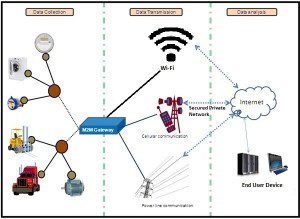In today’s connected world, it’s become unavoidable for people to constantly stay in communication. In industry, it’s no different. Via machine to machine (M2M) communication and the internet, equipment and processes can be constantly monitored and controlled from anywhere. From machinery in a factory, to construction equipment in the field, to marine craft in the middle of the ocean, everything has the ability to stay connected and transfer data. Moreover, diagnostic information can be sent to keep employees informed on the performance of a machine. It’s even possible to have closed-loop control of a process using a simple web interface to set up parameters and collect important data.
 There’s several ways this communication can be established. A machine in a factory can simply be connected via Ethernet. However, equipment in the field may not be close to hardwired network infrastructure. In this case, wireless communication is necessary. Traditionally this would be done by Wi-Fi. This presents another problem: Security. A few years ago Target suffered a massive security breach. It resulted in the theft of credit card numbers and personal data from millions of people. The breach happened because an HVAC contractor connected to Target’s wireless network. Hackers stole the contractor’s credentials and used them to gain access and upload malware to Target’s network. From this example, it is clear that Wi-Fi is very vulnerable and the smallest breach in the security of a network can have disastrous consequences.
There’s several ways this communication can be established. A machine in a factory can simply be connected via Ethernet. However, equipment in the field may not be close to hardwired network infrastructure. In this case, wireless communication is necessary. Traditionally this would be done by Wi-Fi. This presents another problem: Security. A few years ago Target suffered a massive security breach. It resulted in the theft of credit card numbers and personal data from millions of people. The breach happened because an HVAC contractor connected to Target’s wireless network. Hackers stole the contractor’s credentials and used them to gain access and upload malware to Target’s network. From this example, it is clear that Wi-Fi is very vulnerable and the smallest breach in the security of a network can have disastrous consequences.
Thankfully, there’s cellular technology, which can provide a much safer and more secure way to transmit data. A secured private cellular network can be used to provide connectivity without the security risk of Wi-Fi. A modem can be either embedded into the circuit board of a device, or can be externally connected to a device that is already installed. The data is then simply transmitted over the private network and directly to the end user on any type of device.
NLS designs products from the conceptual stage all the way through production. In designing a product, it’s important to keep in mind what kind of communication is going to be required, and which option would best suit the intended operation. Determining this at the beginning of a project leads to maximizing efficiency while minimizing costs. NLS has partnered with Verizon to implement cellular technology into products at any stage during the design. By utilizing cellular M2M communication virtually any process can be securely monitored and controlled, ultimately improving efficiency.
